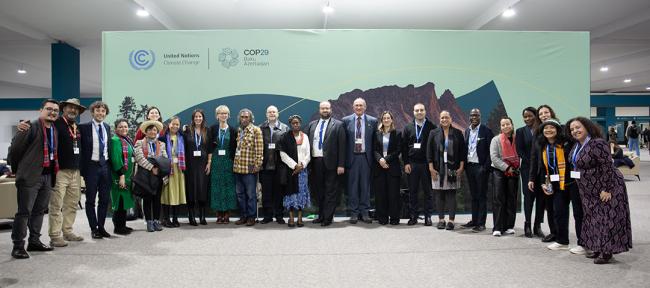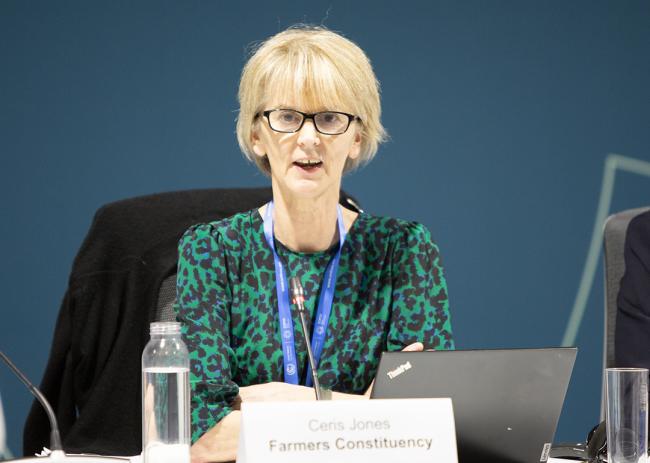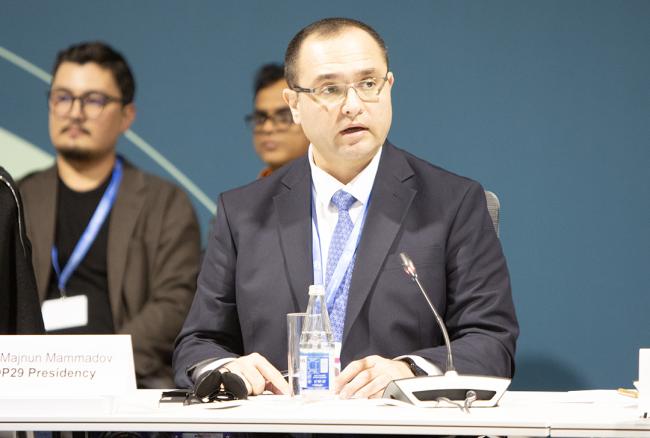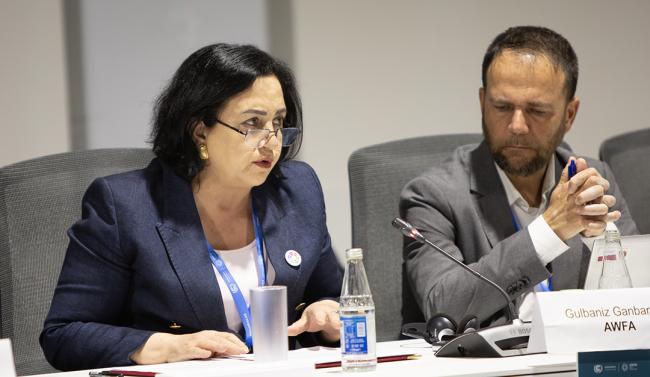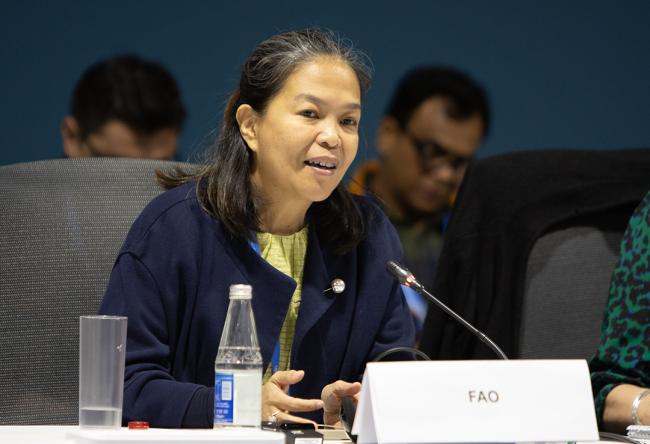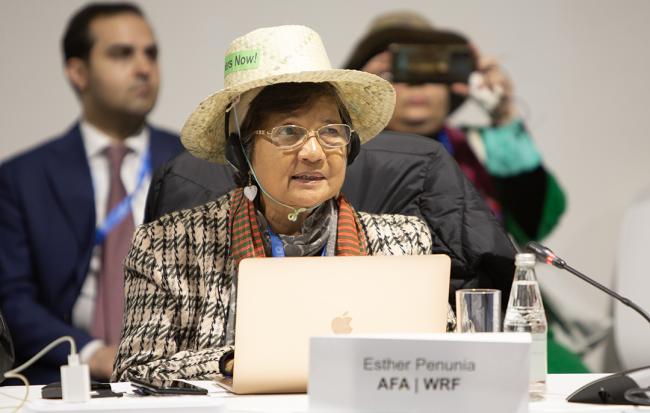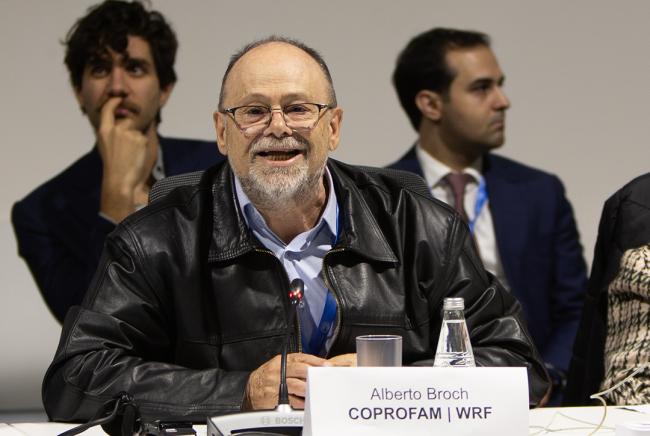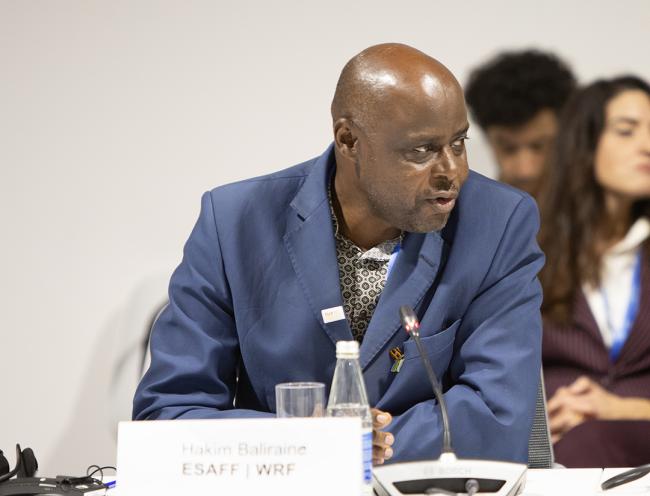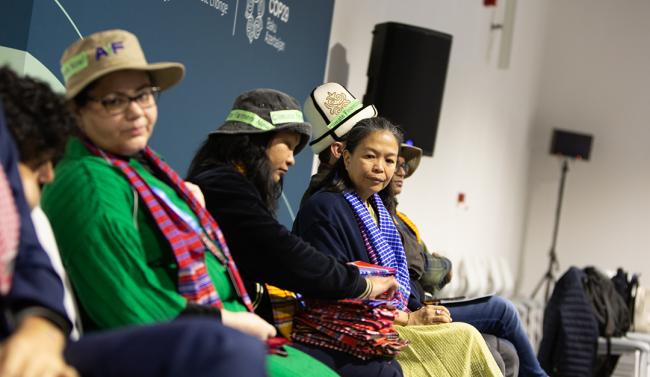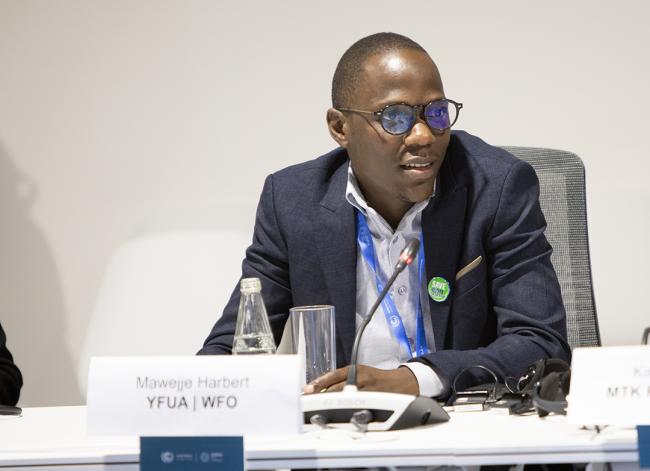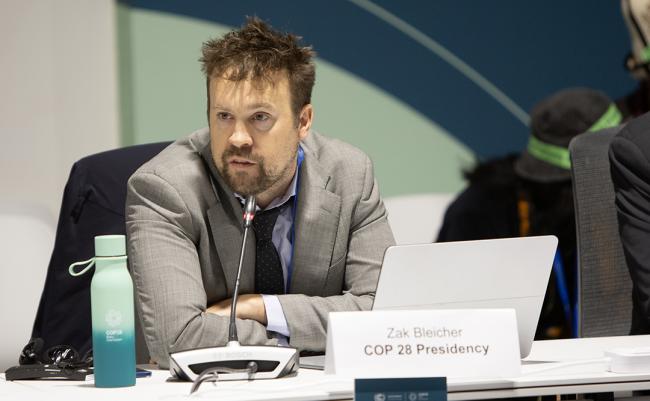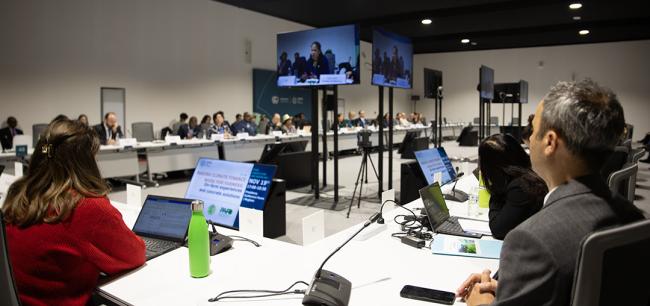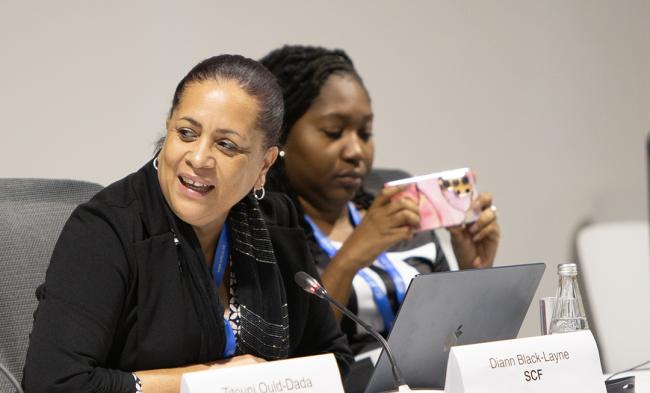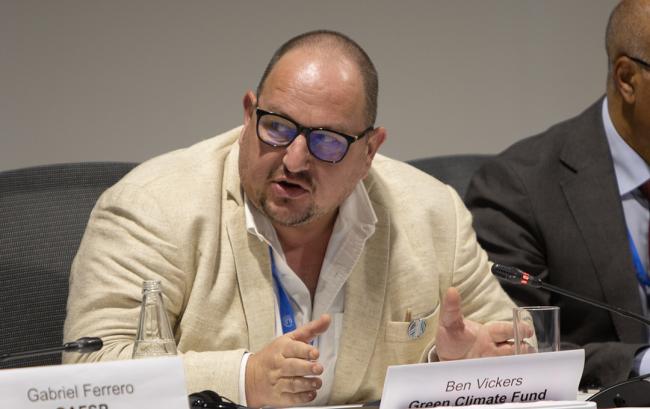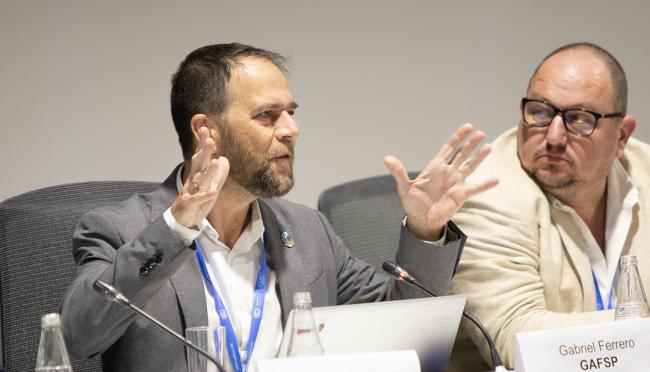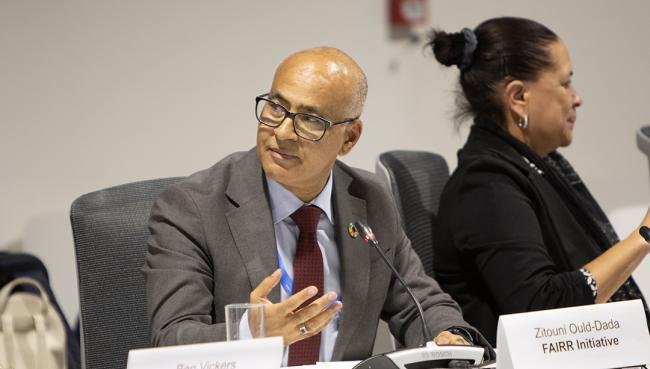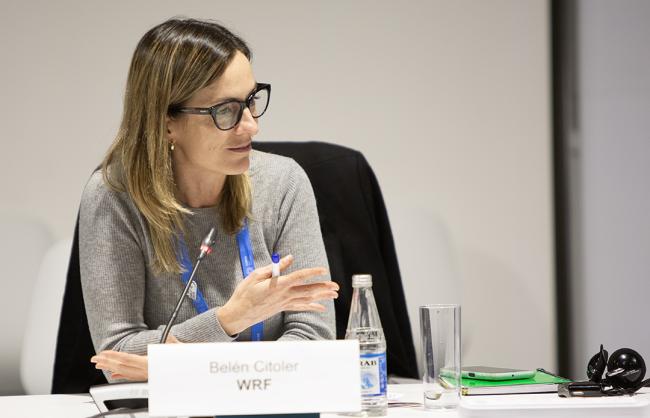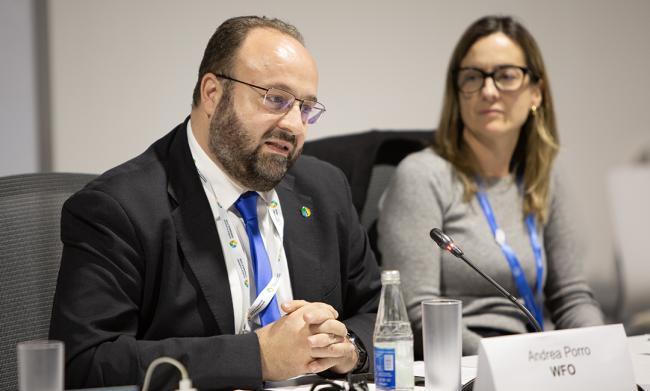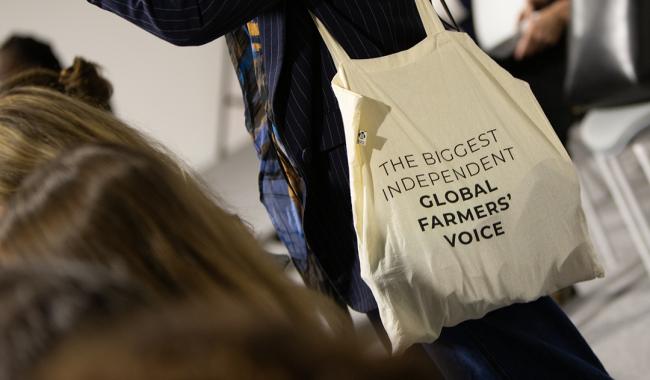About
On the sidelines of COP 29, participants discussed how to restructure climate finance so smallholder farmers and farmers’ organizations can adapt and remain resilient to climate change.
Family farmers produce over 80% of the world’s food based on value, face disproportionate climate risks, and receive only 0.3% of the world’s public international climate finance. Without adequate financial support, the ability of smallholder farmers to produce food sustainably is at risk. During this event, participants discussed ways to expand and structure climate finance to empower family farmers’ organizations in the context of climate adaptation and resilience.
Ceris Jones, Farmers Constituency, moderated the first half of the event. In opening remarks, she outlined the critical role of family farmers in food security and emphasized the pressing need to unlock finance to reach those most in need.
Majnun Mammadov, Minister of Agriculture, Azerbaijan, emphasized that today’s decisions will shape the resilience and sustainability of agriculture for generations to come and underscored Azerbaijan’s commitment to supporting farmers. Recognizing that the future of agriculture lies in innovation, technology, and inclusivity, he highlighted priority initiatives to help farmers adopt cutting-edge technology, and said these advancements are essential both for increasing yields and building a foundation for sustainable agricultural practices. Mammadov emphasized the need for empowering women and youth in agriculture, saying their involvement is a strategic imperative for the sustainability and dynamism of the sector. He further invited farmers worldwide to support the Baku Harmoniya Climate Initiative for Farmers (Harmoniya Initiative), which builds on COP 27’s Food and Agriculture for Sustainable Transformation (FAST) Partnership and the COP 28 UAE Declaration on Sustainable Agriculture, Resilient Food Systems, and Climate Action (UAE Declaration). In closing, he called for empowering farming communities and commitment to a shared vision for a more resilient agricultural sector.
Citing economic challenges faced by many women, Gulbaniz Ganbarova, Chairperson, Azerbaijan Rural Women’s Association, highlighted the success of women’s empowerment and business development groups in enabling women to save money together, start their own businesses, and hire other women. She underscored the potential of women to produce food, cited the importance of investing in the self reliance of women farmers, and called for a comprehensive approach for the development of their agricultural production.
Imelda Bacudo, Food and Agriculture Organization of the UN (FAO), underscored the value of the Harmoniya Initiative in facilitating cohesion and coordination among stakeholders and said that partners are already coming together for farmers.
In the first panel, participants discussed initiatives they are implementing to address climate challenges, as well as their proposal to scale up these experiences through a trust fund facility for the empowerment and resilience of family farmers.
After sharing examples from her region, Esther Penunia, Secretary General of the Asian Farmers’ Association for Sustainable Rural Development (AFA), urged Member States to increase climate finance for farmers and ensure that these funds are directly accessible to them. She also emphasized the critical need for capacity building for women, investment in research and innovation, and the establishment of a dedicated fund specifically for farmers.
Alberto Broch, President, Confederation of Family Producer Organizations of the Expanded Mercosur (COPROFAM), and Vice-President, World Rural Forum (WRF), emphasized that family farmers: are on the front lines of the climate crisis; face many challenges, including water access and funding inequities; and want “real access” to climate funds.
Hakim Baliraine, Eastern and Southern Africa Small Scale Farmers’ Forum (ESAFF) and WRF, emphasized the problem of growing hunger in Africa, as well as soil degradation and climate-related shocks. He underscored the need to mobilize funding to improve food security and adaptation, noted that the process for securing private finance is too long, and called for implementation of the polluter pays principle.
Kati Partanen, Central Union of Agricultural Producers and Forest Owners (MTK) Finland, and World Farmers' Organization (WFO), highlighted the importance of national laws in creating obligations for climate action. She cited the potential for offering incentives such as premium prices to farmers who reduce carbon emissions and increase sequestration.
Emphasizing that young farmers will be affected by decisions taken in boardrooms to which they lack access, Mawejji Harbert, Young Farmers’ Federation of Uganda (UNFYA) and WFO, questioned how finance will reach farmers and said it must be accessible if we are to achieve a just transition.
In the second session, moderated by Elena Aguayo, WRF, representatives from governments, international organizations, and both public and private financing bodies discussed ways in which stakeholders can contribute to enhancing the accessibility and effectiveness of climate finance for farmers.
Reiterating that climate change poses an “essential threat” to agriculture, Zak Bleicher, Senior Advisor on Food Systems, COP 28 Presidency, reminded participants that the UAE Declaration sets out a series of actions to support farmers. He underscored the importance of increasing climate finance overall and the amount which reaches small-scale farmers, in particular.
Diann Black-Layne, Co-Chair, Standing Committee on Finance (SCF): called for farmers to be thought of as small businesses; highlighted the need to simplify project documents to make them more accessible to stakeholders and beneficiaries; said the monitoring and evaluation system is burdensome and must be addressed; and called for redirecting funds currently being paid to consultants to farmers. She concluded there is potential to change the current system and called on farmers to be bold in stating their needs.
Ben Vickers, Green Climate Fund (GCF), emphasized the GCF’s aim of ensuring that financing is successful and said it is undergoing a restructuring to make the accreditation track more accessible. He highlighted examples of successful projects and said a significant portion of adaptation finance is channeled to agriculture initiatives.
Gabriel Ferrero, Ambassador at Large for Global Food Security, Ministry of Foreign Affairs, European Union and Cooperation, Spain, underscored the need for comprehensive financing instruments with different options that are accessible to family farmers and noted the importance of integrated investments in biodiversity, climate, and soil. He underscored the importance of strong farmer organizations and empowering women and other smallholder farmers. He explained that the complex landscape of instruments needs to be defragmented.
Zitouni Ould-Dada, Farm Animal Investment Risk and Return (FAIRR) Initiative, explained that the FAIRR Initiative raises awareness of the risks to agrifood systems arising from climate change, biodiversity loss, deforestation, and pollution. He said investors recognize these risks and know that business as usual is now very risky because extreme weather events are affecting global food security. He underscored the need to use Nationally Determined Contributions (NDCs) as a means of connecting policy to investment and, citing the disconnect between the goals of the Paris Agreement and agriculture subsidies, called for improving policy alignment.
In concluding remarks, Bélen Citoler, WRF, highlighted the need to ensure that family farmers, women, and youth remain at the center of the discussions. She further underscored the importance of continuing the dialogue among family farmers and all relevant stakeholders, as well as their engagement as equal partners in implementation. Looking to the future, she expressed hope that COP 30 would be a turning point for family farmers.
Andrea Porro, WFO, highlighted the importance of convergence with national farmers’ organizations, and called for their involvement in the design of innovation, policy, and financial tools. Underscoring that farmers are valuable economic actors, he said these tools should be envisioned as an investment, not charity, and that young farmers are stakeholders who should be rewarded as entrepreneurs.
Organizers: COP 29 Presidency, FAO, WFO
Contacts: Imelda Bacudo I Imelda.Bacudo@fao.org; Martial Bernoux I Martial.Bernoux@fao.org; Elena Aguayo, World Rural Forum I eaguayo@ruralforum.org
Website: https://www.fao.org/climate-change/action-areas/access-to-climate-finance/en
To receive free coverage of global environmental events delivered to your inbox, subscribe to the ENB Update newsletter.
All ENB photos are free to use with attribution. For 2024 UN Climate Change Conference Baku - Side Events , please use: Photo by IISD/ENB | Angeles Estrada Vigil

